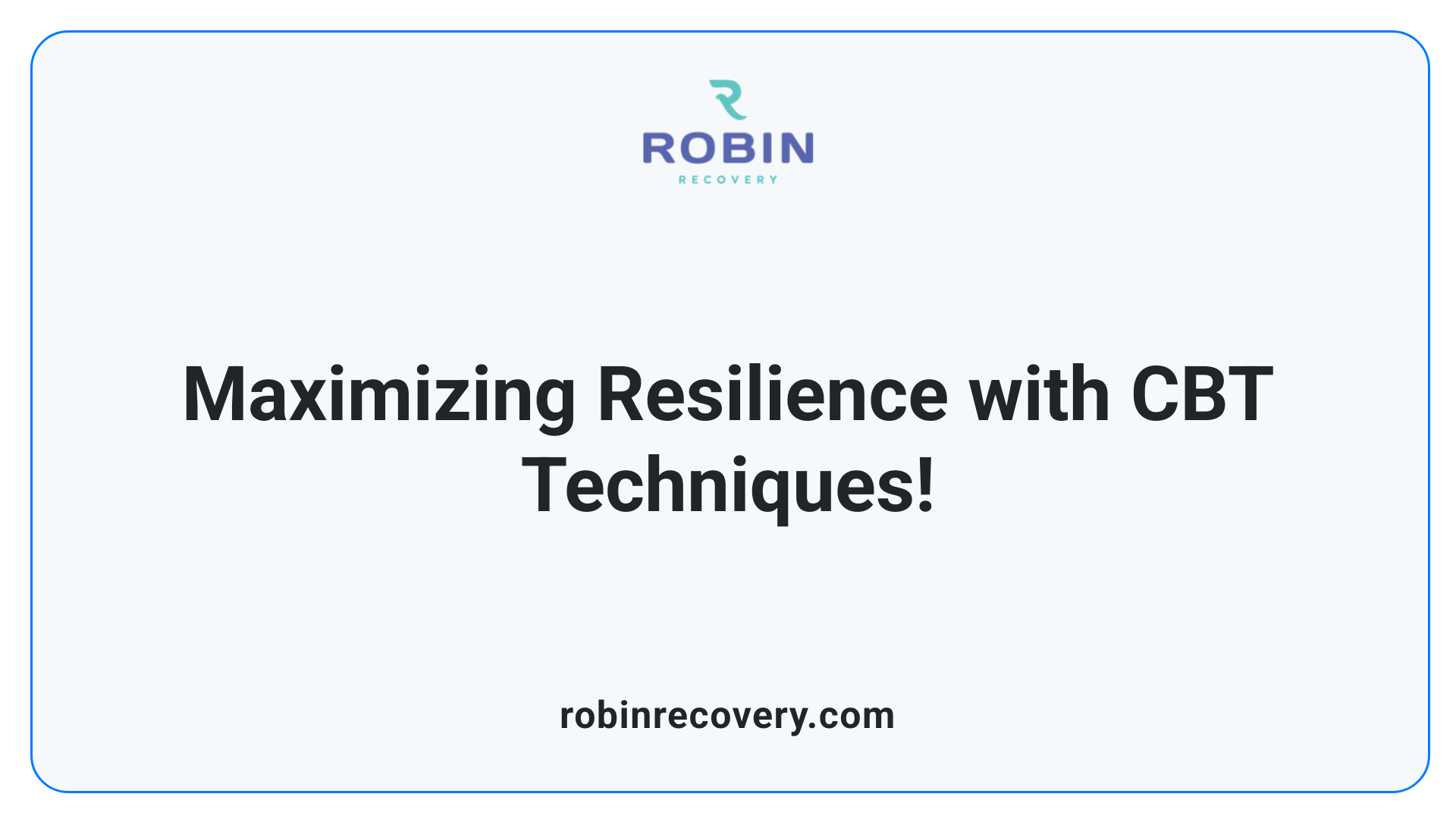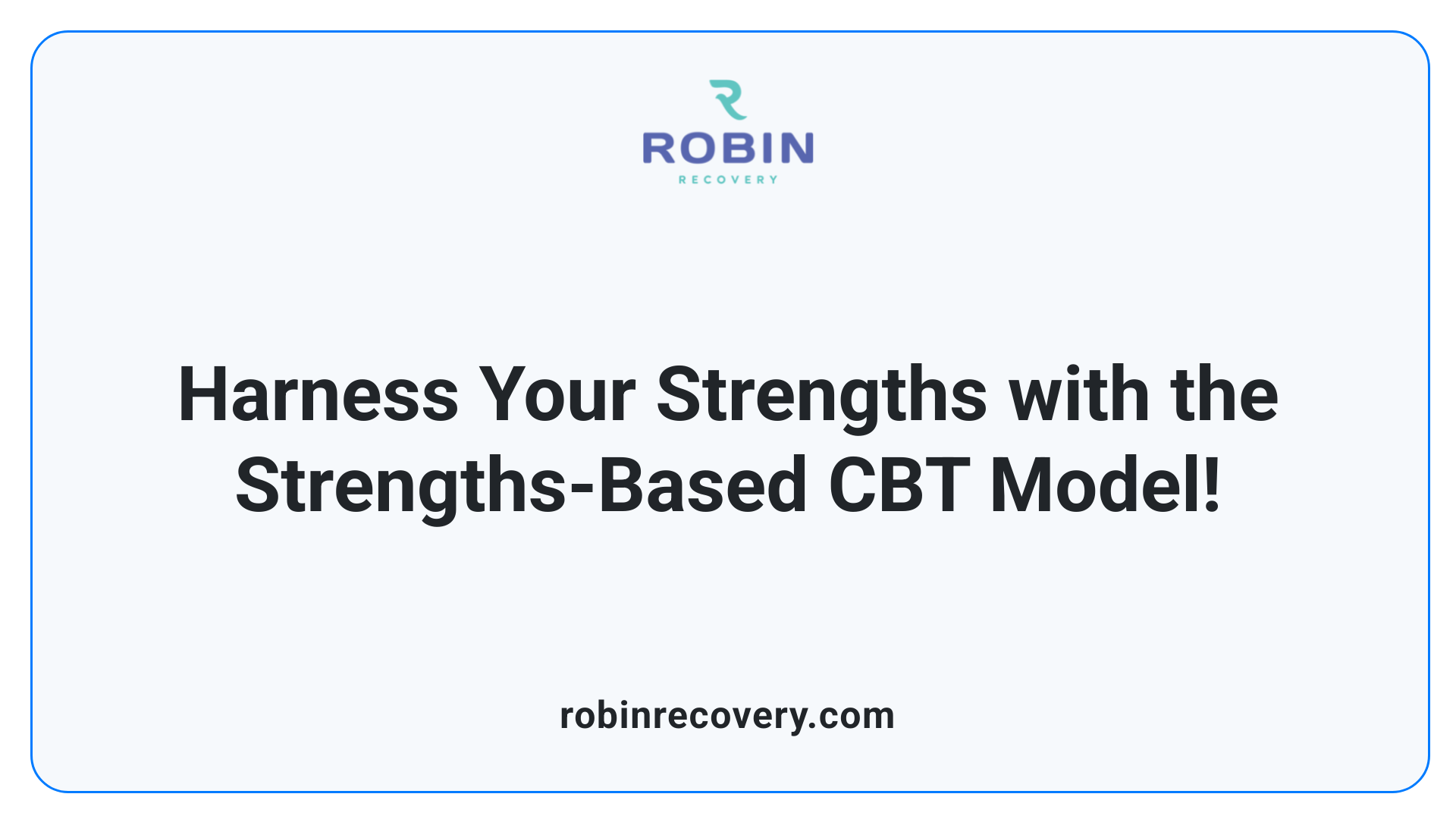How to Build Resilience in Recovery with Cognitive-Behavioral Therapy

Understanding Resilience and CBT in Addiction Recovery
Resilience is a vital quality in addiction recovery, providing individuals with the ability to rebound from setbacks and thrive despite challenges. It involves not just a return to a prior state, but growing stronger through adversity. Cognitive-behavioral therapy (CBT) is a renowned therapeutic approach that enhances resilience by addressing the complex interplay of thoughts, feelings, and behaviors in the recovery journey. Through CBT, individuals learn to reshape negative thought patterns and develop coping strategies crucial for maintaining sobriety and improving mental well-being. This article explores effective strategies for building resilience with CBT, the role of specific techniques, and insights into cultivating a resilient mindset in recovery.
Effective Strategies for Building Resilience in Early Recovery

What are effective strategies for building resilience in early recovery?
Effective strategies for building resilience in early recovery encompass several vital practices. Firstly, establishing strong support networks is paramount. Friends, family, therapists, and support groups can provide emotional encouragement and practical assistance, which significantly reduces feelings of isolation during challenging times.
How can a positive mindset be developed?
Embracing a positive mindset involves viewing challenges as growth opportunities. This perspective fosters improved problem-solving skills and encourages individuals to frame setbacks positively, which is essential for maintaining motivation and resilience through the recovery journey.
What role does self-care and mindfulness play?
Self-care and mindfulness practices are critical for enhancing resilience. By incorporating techniques such as meditation and deep breathing, individuals can manage stress more effectively, maintaining both physical and mental well-being. Regular self-care routines—like adequate sleep and engaging in relaxing activities—are also fundamental in this regard.
How can daily goals reinforce resilience?
Setting achievable daily goals creates a sense of accomplishment. This practice reinforces motivation and encourages a forward-looking approach essential for early recovery. Celebrating small victories helps individuals remain focused on their overall recovery journey.
Why are physical activity and diet important?
Engaging in regular physical activity and maintaining a balanced diet are vital for overall health and mood enhancement. Good nutrition and exercise not only support physical well-being but also boost emotional resilience, making it easier to cope with the stresses associated with recovery.
The Role of CBT in Enhancing Resilience

How does cognitive-behavioral therapy (CBT) enhance resilience during recovery?
Cognitive-behavioral therapy (CBT) enhances resilience during recovery by equipping individuals with tools to identify and challenge negative thought patterns, allowing them to reframe their perspectives on difficult situations. This therapeutic approach emphasizes stress management techniques, such as mindfulness and relaxation strategies, which help reduce anxiety and improve emotional regulation.
Moreover, CBT encourages the development of proactive coping mechanisms. These strategies foster adaptability in the face of challenges, enabling individuals to view setbacks as growth opportunities. By teaching clients to break down overwhelming situations into manageable parts, CBT facilitates a gradual approach to recovery.
Key CBT Techniques
Some essential techniques employed in CBT include:
- Cognitive restructuring: This involves challenging distorted thoughts and replacing them with healthier perspectives, which supports a balanced view of recovery challenges.
- Behavioral activation: Encouraging engagement in positive and fulfilling activities, this technique helps reduce feelings of isolation and hopelessness.
- Exposure therapy: This method assists individuals in facing triggers in a controlled manner, reducing their impact over time.
Building Resilience Through CBT
CBT fosters resilience by promoting a mindset that views obstacles as opportunities for growth. Clients learn to maintain motivation and engagement, reinforcing their sense of self-efficacy and control over their recovery journey. As they develop effective coping strategies and emotional regulation techniques, individuals become better equipped to navigate life's challenges without resorting to unhealthy behaviors.
Understanding the '3 C's' of CBT and Resilience

What are the '3 C's' of cognitive-behavioral therapy and their role in building resilience?
The "3 C's" of cognitive-behavioral therapy—Catch it, Check it, Change it—play a vital role in enhancing resilience by guiding individuals to manage negative thought patterns.
- Catch it: This involves recognizing negative thoughts as they arise. Awareness is the first step in understanding one's emotional reactions to triggers.
- Check it: Here, individuals assess the evidence for those negative thoughts. This self-inquiry can reveal distortions and the over-exaggeration of negative feelings.
- Change it: Finally, individuals actively work to replace these negative thoughts with more constructive ones, fostering a positive mindset.
The relationship between thoughts, feelings, and behaviors is illustrated by the CBT triangle. This framework shows how changing one's thought patterns can significantly improve emotional and behavioral responses.
Addressing self-stigmatizing beliefs, which often stem from societal stigma, is a crucial aspect of therapy. These beliefs can hinder recovery and self-acceptance. Techniques like maintaining thought records assist clients in reframing these harmful thoughts. Organizations like VISN 5 MIRECC support this process by connecting veterans facing mental health challenges with evidence-based therapies and resources tailored to their recovery needs.
The Strengths-Based CBT Model

Could you explain the strengths-based CBT model for building resilience?
The strengths-based cognitive-behavioral therapy (CBT) model focuses on identifying and utilizing personal strengths to foster resilience. This model consists of four essential steps:
- Search for Strengths: Individuals explore their unique abilities and past experiences that helped them overcome challenges. This self-reflection helps to cultivate a deeper appreciation of personal assets.
- Construct a Personal Model of Resilience (PMR): Based on identified strengths, individuals create a framework that outlines their personal approach to resilience. This model serves as a navigational tool during tough times, guiding actions and thoughts.
- Apply the PMR to Areas of Life Difficulty: Individuals use their PMR to effectively address specific life stressors. This application aids in recognizing past successes and strategizing solutions to current challenges.
- Practice Resilience: Regular engagement in resilience-building activities reinforces the learned behaviors from previous steps. Practicing these skills solidifies an adaptive mindset necessary for dealing with future adversities.
This model empowers individuals by emphasizing their strengths, fostering self-efficacy, and enhancing their ability to confront life's difficulties with confidence.
CBT Techniques to Combat Cognitive Distortions

Cognitive Restructuring
Cognitive restructuring is a fundamental technique in Cognitive Behavioral Therapy (CBT) aimed at helping individuals identify and challenge negative thought patterns. In addiction recovery, this method encourages individuals to replace distorted beliefs about themselves and their circumstances with healthier perspectives. For example, if someone thinks, "I will never be able to stay sober," cognitive restructuring enables them to reframe this thought into something more empowering, such as, "I can learn to handle cravings one day at a time."
Behavioral Activation
Behavioral activation is another key CBT technique that focuses on promoting engagement in positive and fulfilling activities. This strategy is particularly effective for those struggling with substance use, as it encourages individuals to partake in healthy behaviors that enhance their mood and well-being, reducing the likelihood of relapse. For instance, engaging in regular exercise or hobbies can provide a sense of achievement and distract from substance-related thoughts.
Reframing Negative Thoughts
Reframing negative thoughts is an essential part of emotional resilience. This technique helps individuals see challenging situations from a different angle, thus fostering optimism. In recovery, recognizing a setback as a learning opportunity, rather than a failure, encourages individuals to persist and develop a growth mindset. By consciously practicing reframing, individuals can cultivate a more positive outlook on their recovery journey.
Integrating Mindfulness and Relapse Prevention
Mindfulness Techniques
Mindfulness techniques, such as meditation, deep breathing, and grounding exercises, play a vital role in enhancing emotional regulation during addiction recovery. By focusing on the present moment, individuals can reduce overwhelming feelings and negative thoughts, fostering a calmer mental state. Practicing mindfulness can empower individuals to recognize their emotions and triggers while managing cravings and stress effectively.
Relapse Prevention
Relapse prevention is crucial in the recovery process. It involves identifying high-risk situations and developing strategies to cope with these triggers. This proactive approach, combined with mindfulness practices, equips individuals with the skills needed to anticipate challenges and respond effectively, reducing the likelihood of relapse.
Emotional Regulation
Emotional regulation is essential for maintaining long-term sobriety. CBT incorporates mindfulness to help individuals cultivate awareness of their emotional responses, allowing them to process setbacks without resorting to substance use. By acknowledging and managing emotions, individuals can develop resilience, adapt to setbacks, and ultimately thrive in their recovery journey.
Strategy Focus area Benefits Mindfulness Practice Emotional Regulation Enhances self-awareness, reduces stress, lowers relapse risk Relapse Prevention Techniques Coping with Triggers Preparedness, develops skills for managing cravings Emotional Regulation Strategies Coping Responses Builds resilience, allows for balanced responses to negative situations
Building a Resilient Recovery
Building resilience through cognitive-behavioral therapy is a transformative process within addiction recovery, empowering individuals to adapt to challenges and sustain long-term sobriety. By learning to navigate cognitive distortions and cultivating positive coping mechanisms, individuals increase their emotional strength and ability to face adversity. A resilient recovery journey is supported by continuous practice of CBT techniques, strong support networks, and a commitment to personal growth. As individuals apply these skills in daily life, they foster a foundation of resilience that fortifies their path towards sustained recovery and well-being.
References
- How to Build Resilience in Recovery - Foundry Treatment Center
- Using cognitive behaviour therapy to explore resilience in the life ...
- Effectiveness of cognitive-behavioral therapy on resilience of adults
- Cognitive-Behavioral Therapy (CBT) Techniques in Addiction ...
- Building Resilience: Strategies for Preventing Relapse and ...
- Useful CBT Techniques for Recovery | Benefits of Mental Health
- Cultivating Resilience: Building Coping Skills In Addiction Recovery
